by admin | Jan 17, 2019 | Uncategorized
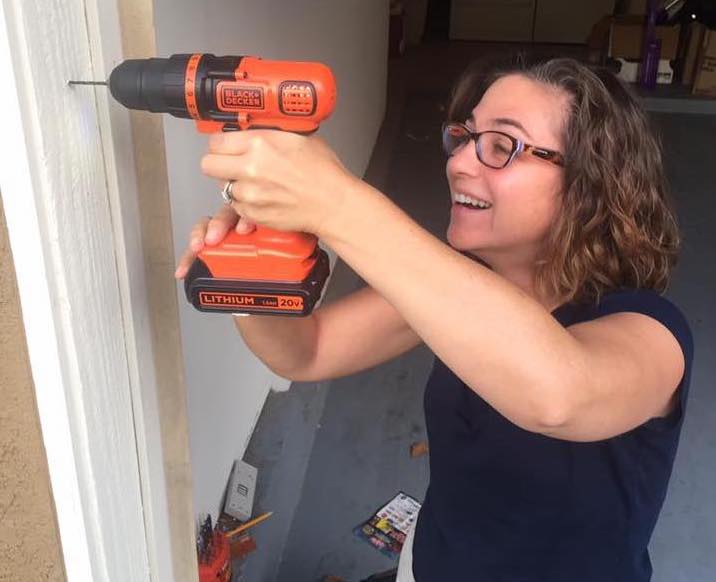
There are four words that when spoken to me incite my most aggressive impulses. I become fiery and almost hostile. It happens fairly regularly and yet, I’m still shocked when I hear it.
Tonight, as the contractor was leaving the house, he said this:
Is your husband around?
That’s it. Is your husband around? What could be so terrible about that little sentence?
Well, the reason I become irate is pretty simple really. I’m a smart woman who can handle just about anything my husband can handle around the house. In fact, generally I’m the one who fixes something when it’s broken. If I can’t fix it, I’m the one who finds, contacts and schedules the work person. I pay the house bills and arranged for the mortgage. And yet, everyone asks if my husband is around.
Just the other day the mortgage company called and asked for Mr. Pearlman even though both of our names are on the loan. Why not just ask for Mr. or Mrs. Pearlman? No one thinks Mrs. (actually, it’s Dr.) Pearlman can handle any of the “big” decisions for the family. The solar company wouldn’t even come to the house if my husband wasn’t going to be there (yes, they lost my business).
Apparently, I am not qualified to make decisions about, basically anything. I couldn’t possibly understand how to turn the water off to the house. I probably wouldn’t be able to discuss the fee for the gardener to do an additional job in the yard even though I am the person discussing it with him. I likely couldn’t understand the tricky financial lingo from the bank. I’m the one who has purchased all of our cars and yet every car salesman talks to my husband upon arrival. That all infuriates me on so many levels.
My husband does a lot around the house and raising the kids. He does all the laundry, cleans all the dishes, runs to the supermarket, takes the cars in for service, shuttles the kids endlessly, talks to coaches and teachers, arranges pick up and so much more. He’s a 50% parent, and I’m a lucky lady. He also takes care of mice and bugs, because I cannot do that (although I’m great at hiring the exterminator). Clearly, we dodge typical gender roles. And that tickles me. My dad taught me to fix things. When we bought our first house, he bought me a drill, and I adore that drill. I used it recently to hang my son’s shelves. My mom taught me how to ask for a supervisor and write a letter to speak my mind. My grandmother loves to tell the story of how she acted as the general contractor in the 1950s to build her house from scratch.

The house my grandmother built
I grew up wanting to be a woman who can do just about anything if I set my mind to it. And usually I believe I can. But every time someone asks for my husband all of my effort and education and time is relegated insignificant. Actually, I become insignificant. If mothers are taking on most of the emotional labor for the family, exactly when are we going to get credit for that? I’m waiting, not so patiently.
by admin | Dec 2, 2018 | Blog
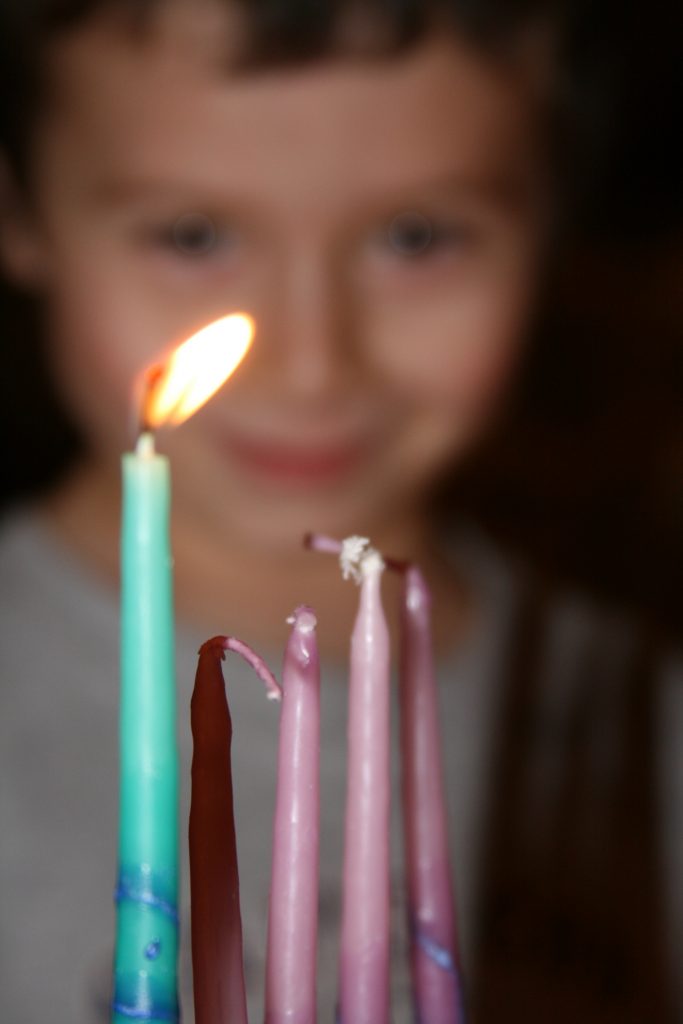
This week I walked into the lobby at work to see a two-story glistening Christmas tree with flowing red ribbon and lights. Presents are wrapped perfectly under the tree. The back office is tastefully decorated with lights and snowy scenes and garland. It’s really a stunning display. And yet, after the initial pleasantness of the decorations started to wane, I was hit but a familiar question: Why didn’t someone think to add a menorah to the holiday display?
Not everyone celebrates Christmas. Among other groups, Jewish people don’t. When we moved from New York to California it surprised our kids a bit to learn that almost every friend celebrates Christmas. When they tell their buddies, “We are Jewish,” the harmless questions begin.
Ok you’re Jewish, but you still celebrate Christmas, right?
No, we don’t.
But you still have a tree, right?
Nope.
No Santa? No presents on Christmas morning?
No to it all.
What do you do on Christmas?
Chinese food and movies.
These are all reasonable questions. Kids should ask questions. But what underlies the questions I think is what was bothering me about the Christmas tree decoration at work. I couldn’t shake the discomfort about it. But I also couldn’t put my finger on what was really upsetting me. So, while I shuttled my son Emmett to trampoline practice, I explained the situation at work. Then I asked him, “What do you think about when you see Christmas decorations in public without any support for Chanukah? Do you think businesses should put up a menorah?” I waited to see if he understood my question.
Thankfully, kids sometimes cut through lots of baggage and find the real issue quicker than their parents. Emmett summed it up perfectly. He said, “There’s nothing wrong with just having a Christmas tree. It’s just extra nice when someone puts up a menorah.” That’s it. Nothing wrong with celebrating Christmas and sharing your love for the holiday with copious amounts of decoration. I love the lights and the trees and the songs. I don’t care if someone puts their lights and tree up before Halloween or if they keep it up until Valentine’s day. I don’t mind Christmas music at Target on the first day of November. I actually enjoy it. Last year at work I participated in my first Christmas cookie exchange, and it was so much fun. And I just bought stupidly expensive tickets so that my entire family can go see Emmet Otter’s Jig Band Christmas in the theater. I’m down with Christmas, and I don’t have sour grapes about not getting to celebrate it. I guess I was missing was a tiny acknowledgement that in public spaces it’s ok to go the extra mile and support the Jews.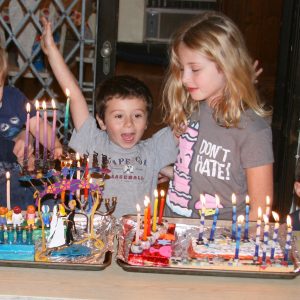
There has been antisemitism for as long as there have been Jews. But with the 24-hour news cycle and social media I’m bombarded with it more regularly now than years ago. I admit it stings a little more with each new episode. A few days after people were gunned down in a synagogue in Pittsburgh someone painted swastikas on a temple a few miles from my own. This week a professor at Columbia University was treated to the same vile display in her campus office. In response to these incidents my synagogue decided to hire armed guards so now I have to pass guns and sometimes cop cars just to walk my kids into Hebrew School. If you haven’t experienced this let me tell you, it’s unspeakably horrendous.
So, when the Jews are feeling down because lots and lots of people hate us and some of those people feel emboldened to publicly display their disgust and gun us down, it feels like it would be an extra special step to add a menorah to holiday displays. It’s not required. It’s just extra nice.
by admin | Nov 27, 2018 | Blog
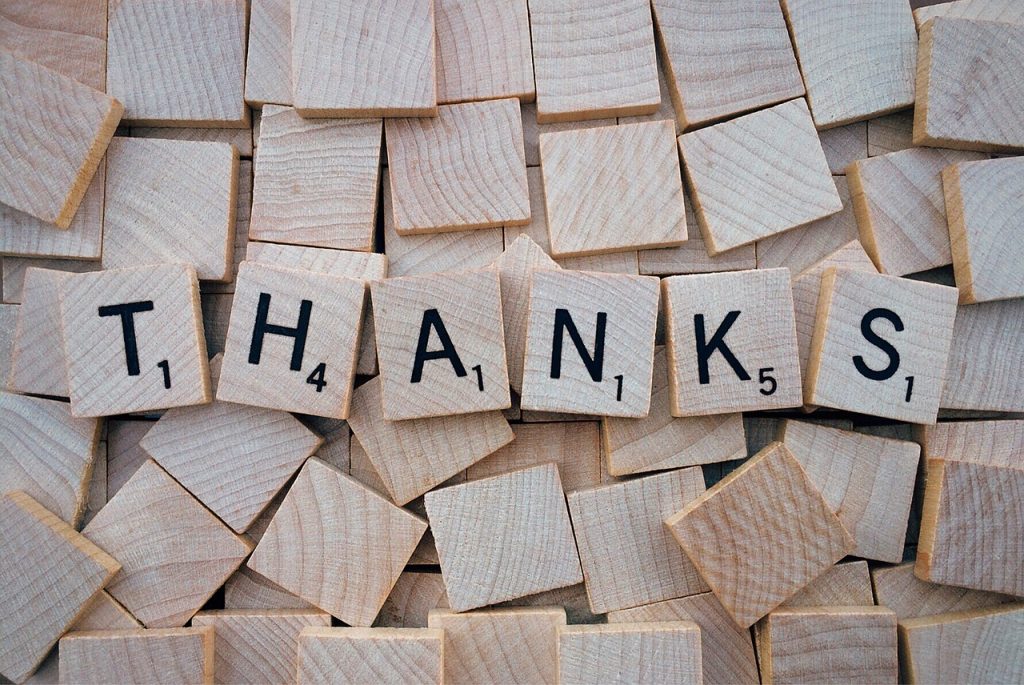
Consumerism in America is big business, and more than ever children are being bombarded with sensational toys and technology. It’s only natural that kids want these shiny new objects. When holiday time comes around many parents spend hours finding just the right gifts, wrapping them oh, so specially and waiting excitedly for the big reveal. Moms and Dads are filled with joy envisioning their kids’ faces when they see what they’ve been given. But all too often parents can feel deflated when their kids appear to be somewhat less than grateful for their bounty.
Like clockwork, one question always comes up right after the holidays: How can parents teach children to be more grateful? Taking toys away isn’t the answer. Neither is telling children there are starving children in the fill-in-the-blank developing country who would love to have these gifts. These attempts are useless and often come off more like an accusation than a teaching moment.
Kids aren’t grateful but it’s not because they are horrible spoiled brats. They aren’t excessively thankful because they haven’t learned the alternative. Most kids live in a bubble of their community. They know what they see, and in many cases, they see lots of excess. Additionally, most parents want to give their children all they can, and they usually do. However, parents rarely talk to kids about financial hardships. They hide how much they have to work to obtain enough money to pay for everything. Most don’t talk about the stress that can accompany providing. So, it makes perfect sense that children don’t really get the big picture.
Also, children aren’t born with empathy. It’s fairly difficult to be thankful for what you have if you can’t put yourself in the shoes of others who have less. How can we appreciate what we have until we realize that not everyone is so fortunate? Infants and toddlers have little capacity to understand the feelings of others or to be internally grateful for anything. But as children grow up, with careful coaxing and attention from parents, they can develop a strong sense of empathy and thus gratitude.
Now to answer the inevitable question of gratitude, here are eight suggestions to keep in mind this holiday season and beyond. Remember though that kids learn over time. So, little acts completed more often are better than any one big attempt at teaching gratitude.
Look in the mirror. Are you grateful, and do you express it regularly in front of your children? Start thanking your children for cleaning up their toys or offering you a hand in the kitchen. Tell your partner regularly how grateful you are that he or she did the cooking or loaded the dishwasher or took care of the bills. Let the kids see you writing thank you notes to friends and family for gifts you have received. Share your charitable endeavors with the kids. Find ways for them to contribute or at least share your passion for your chosen project with them.
Make the world a better a place, one act at a time. Helping others, doing good deeds, sharing joy all help kids appreciate what they have. It’s easy for parents get bogged down with the enormity of raising good humans. Instead of working on one huge project (although that’s fine) try to work on many simple acts of kindness on a regular basis. One year our family did a good deed a week, and it was amazing to see the change in my kids. We picked up trash around the local Starbucks. We baked cookies for the homeless shelter and neighbors. We did a toy drive. We wrote cards for the troops. Sometimes we just made sure to hold a door open or offer a ride or give a compliment. No act was too small to be recognized. Being kind and being grateful are highly connected.
Volunteer your time with the kids. During Thanksgiving and Christmas shelters and soup kitchens are inundated with volunteers. However, the rest of the year is often a scramble. Find a shelter, church or mission that allows families to serve. Volunteer to sort through canned goods to a food bank and bring the kids. Fold clothes at a thrift store. Deliver flowers in the hospital or visit an elderly person in a nursing home. Check out Volunteer Match to find local opportunities near you.
Adopt-A-Family. There is no shortage of families who struggle this time of year to provide the basics for their families, let alone gifts. Lots of agencies allow you to adopt a family and provide gifts for the kids. You receive the ages and sex of the kids, sometimes their interests, then you go out and buy the toys. The agency then delivers the toys for the family to wrap before the holidays. Bring your kids in on the action. Let them help you pick gifts and explain to them why you are doing it.
Travel. There might be no better way for children (and adults) to learn to be grateful for what they have than when they get out of their neighborhood and see how others live.
Find Diversity. When kids are exposed to people who look differently, eat differently, pray differently or live differently, they grow enormously. Finding diversity could be eating in a restaurant that serves food from a faraway country. It could be attending a religious service with a friend. It could be organizing a cultural harvest day at school where everyone brings in something to eat typical of their roots. It could be inviting an immigrant family over for dinner at your house.
Make Lemonade. Create a lemonade stand or a bake sale at your kid’s school to benefit a charity. Ask for additional donations at that time. Let the kids pick the charity to donate the money. When my kids were little a friend and cousin both had cancer, so we raised money for Alex’s Lemonade Stand. If a grandparent has Alzheimer’s disease focus funds there. If there was a recent storm or fire give the money to help rebuild. The key is to find something meaningful to your kids.
Watch Documentaries. There are so many powerful movies that can help children understand how much they take for granted. Some movies even have discussion suggestions for families. A good place to look for movies is on Common Sense Media. Here are some of my favorites: Batkid Begins, A Place at the Table, Bully, Paperclips, He Named Me Malala, I Am Eleven, Waiting for Superman, Hoop Dreams, Motel Kids of Orange County, and Happy.
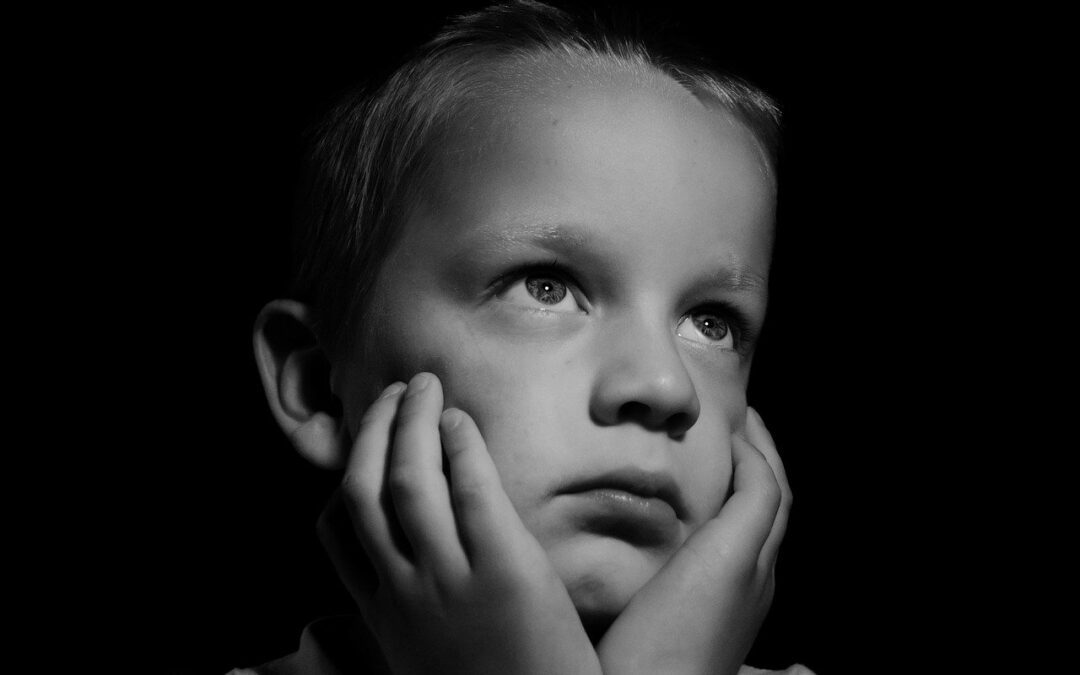
by admin | Oct 28, 2018 | Blog, Uncategorized
Dear Kids,
I’m writing to you because you are old enough to know the truth. Actually, you aren’t. You are innocent children who deserve a childhood without fears and nightmares. But the truth is unavoidable, and at this moment there is nothing else I can say. So here it is.
I cannot protect you from a gunman. Not at preschool. Not at a concert. Not even in temple. There is no amount of guns that can make you safe because those same guns will always find a way into the wrong hands. If someone wants to kill you while you are peacefully playing tag in the playground, I cannot help you. If you are having fun at a concert with your friends or enjoying the latest movie in the theater, I cannot protect you. You could get shot, and you might die.
My beautiful daughter, I can almost guarantee you will experience lots and lots of sexual harassment. You will have unwanted attention from strangers who will look at your body and sexualize it. You will probably have a boss who will discriminate against you because you are a female or while you are pregnant or after the birth of your beloved child. You may even be raped by a stranger, or worse, someone you know. And if you choose to speak up you may not be believed. You may lose everything in the process. There are people in powerful positions who will work to silence your voice. Even if you present the most compelling evidence and you are believed, sometimes nothing will change. Because lots of people don’t care.
I’d like to tell you that you get to make decisions about what happens to and in your body, but I can’t. The right to an abortion is a fragile one, and there’s a chance you may lose that right. Even if your life is at risk, you may not be able to have life-saving surgery because some will value your fetus more than you. Don’t think you can rely on contraception to avoid an unwanted pregnancy because that right may go away too. Depending on where you live or where you work you may not have access to an IUD or the pill. And you may not always have enough money for condoms. This makes me terribly sad, and I’m sorry.
My science-loving boy, I’d like to tell you that science and data matter. That people rely on high-quality research conducted by respected institutions around the world to make decisions about our planet. But that’s not always true. There are many people who look at widely accepted beliefs about climate change and deny the existence of overwhelming data. Some people will govern with the narrow focus of getting themselves reelected. They make the rules that we all have to live by. Your grandchildren may not have any water to drink or a dry place to build a house. I know it’s scary but that is already happening to many.
You have the right to vote and voting matters. You still have this right, but some will make it difficult to actually cast your ballot. People will change the rules at the last minute to favor their political party. They will try to minimize dissenting voices by making it difficult to vote by asking for identification or limiting voting hours or moving polling locations without notice. People will say every vote counts but sometimes it doesn’t. The popular vote can go to one candidate but an antiquated system will have the electoral college pick a different winner.
In these horrible times I wake up nearly every day with astonishing disappointment and pain. So it’s really hard to continue to pretend that these terrible things won’t happen here. I cannot look into your beautiful innocent eyes and say, “It can’t happen to you.” It can. It happened to school kids just like you in Miami and Newtown and Columbine. It happened in the supermarket in Kentucky and in a temple in Pittsburgh. It happened to a professor, just like me. The congressman in our district doesn’t believe in climate change. It’s all around you, and I can’t lie to you.
But in all of this painful uncertainty, there are some truths that might help you.
I will speak up to do my best to protect you. I’ll do this by fighting the school district or suing my employer for discrimination or by writing about injustice. Speaking up may not always change things but it will show people that I care and support them. That’s not nothing. If I see something that is hurting someone, I’ll say something. If I can right a wrong, I’ll do it. It will not always be easy. But that’s usually when it’s most important. I will do this for you and you must do it for others.
I will vote until my last breath. I still believe change can come. People sacrificed in significant ways to give us the right to vote. I’ll do what I can to protect that vote, and I’ll exercise my right in every single election.
I will create a home where everyone is welcome to Sunday dinner or Passover regardless of faith or race or sexuality. I’ll make Christmas dinner for our Christian friends or Iftar for the Muslim ones. Why? Because our lives are made better by people who are not exactly like us. I’ll teach you to be open-minded and have an open heart. I’ll be kind and generous whenever I can and sometimes when I think I can’t. I’ll show you that you can make a change in this world even if it’s just to one person. To that person, that might be the difference between life and death.
I will try to live my life to the fullest because bad things can happen. I can’t prevent a lot of the bad things I mentioned. But they are less painful when we live our truest best life. Go out and live your lives and enjoy it. We owe that to the people who have been lost.
I love you. I pray that’s enough to comfort you.
Love, Mom
by admin | Sep 29, 2018 | Blog

Andrew Harnik/Getty Images
If you saw Brett Kavanaugh testify before the Senate Judiciary Committee this week you undoubtedly noticed his anger. According to Kavanaugh, he is being wrongfully accused of attacking Christine Blasey Ford at a gathering with some friends in 1982. What stands out from his appearance, and there was a lot to take in, is Kavanaugh’s visible rage. His facial expressions were so intense he looked like Jack Nicholson in A Few Good Men right before he yelled, “You can’t handle the truth.” Kavanaugh was the personification of Cujo, the dog from the Stephen King novel in the most unbecoming nature for a Supreme Court Judge. I think I keep turning towards movies to process his indignation because I’m having trouble with the extent of how much he lost control in that moment.
Of course, anyone who believes he is being wrongfully accused of something would be angry. And it would be reasonable even for someone to crack under the pressure of the enormity of the confirmation hearings. If something I worked my entire life to achieve was hanging by a thread I’d be hostile too. But there is more to Kavanaugh’s anger that needs to be explored. I believe part of the reason he is so filled with fury is because he truly may have no memory whatsoever about the night in question. It’s so completely not ingrained in his mind that he cannot fathom that it actually could have happened much like it is being reported.
In the 1980s I went to hundreds of gatherings just like the one described by Ford. Living in New York City it was easy enough for minors to find some alcohol. We drank for fun, and we often drank in excess. Of all the nights we did that I probably only remember a handful of actual moments from that time. They all blend into one large memory. That’s because during that time I wasn’t assaulted. Nothing out of the ordinary happened to jog my memory. I’ve learned in the last few years of several girls I knew who were victims of attacks. Some girls were victims of slut-shaming or unwanted sexual advances as well. I can promise you those girls remember the exact party where the incidents happened but many of their aggressors might not. (To those girls, I’m sorry I didn’t know, and I’m sorry I didn’t do more regardless.) How could they remember but I don’t? Surely, I was at some of those parties.
In college I remember one time being so drunk that after kissing a boy I turned to the side to be sick. Immediately after throwing up I looked up to find the boy was ready to kiss me again. I remember being disgusted by that fact. Who would want to kiss a girl who had just puked right in front of him? However, I wasn’t disturbed that I couldn’t possibly give consent in that state. Consent wasn’t even a concept I considered much. If you ask that boy if he remembered the incident he would likely say it didn’t happen. Why would he say that? Because he wouldn’t have remembered it. That night probably wasn’t different for him than any other night of the school year. He and his fraternity boys drank every single weekend to excess and every single weekend there were girls around to pursue. It’s like Ground Hogs Day. Wake up and do it all over again. Just change out some of the girls, but really the faces didn’t matter that much anyway.
I believe that is the explanation for why Christine Blasey Ford is 100% certain her attack happened and 100% certain that Brett Kavanaugh is the attacker. Meanwhile Kavanaugh claims he doesn’t even recall the get together. For Kavanaugh that summer was all parties and workouts and Beach Week. Kavanaugh and his pals drank to excess on so many occasions one particular night 36 years ago perhaps wouldn’t be recollected. He also pursued girls to add to his purported conquest list with the regularity of a part-time job. You know, the whole boys will be boys thing. Since Ford got away, nothing much of note happened. Right? Of course, not right. For Ford that night changed her entire life, so much so that in 2012 she was still discussing the assault with a therapist.
Brett Kavanaugh was so aggressively trying to deny being at the party because he may not remember it. It’s not because he may have blacked out but more likely that night was similar to so many. This is also the exact reason he would not ask for an FBI investigation. Because he knows in the back of his mind that he pursued girls with zeal in those days and that he drank excessively. He knows there is a possibility that something could have happened, and he just doesn’t remember it because it wasn’t out of the ordinary. Imagine how scary that must feel. What looks like rage during his testimony might have been more like a desperate attempt to hide the fear of not knowing for sure if you are innocent. The more afraid one is the more belligerent he appears.
It’s unclear what kind of investigation will occur in the next week with the FBI. It’s also unclear if this incident, whether shown to be true or not, will have an impact on Kavanaugh’s nomination. But what is 100% crystal clear is that this hearing has had an enormous impact on millions of women. One can only hope the same impact will be felt by millions of men as well and in 36 years from now so much of our culture will have changed.







